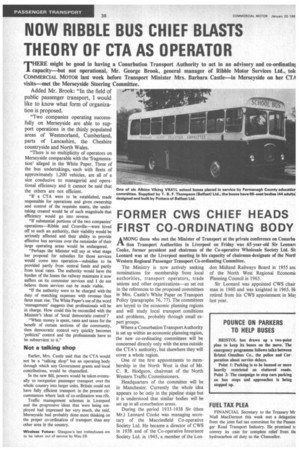NOW RIBBLE BUS CHIEF BLASTS THEORY OF CTA AS OPERATOR
Page 40

If you've noticed an error in this article please click here to report it so we can fix it.
THERE might be good in having a Conurbation Transport Authority to act in an advisory and co-ordinatim capacity—but not operational, Mr. George Brook, general manager of Ribble Motor Services Ltd., tok COMMERCIAL MOTOR last week before Transport Minister Mrs. Barbara Castle—in Merseyside on her CTA visits—met the Merseyside Steering Committee.
Added Mr. Brook: "In the field of /public passenger transport, I would like to know what form of organization is proposed.
"Two companies operating successfully on Merseyside are able to support operations in the thinly populated areas of Westmorland, Cumberland, parts of Lancashire, the Cheshire countryside and North Wales.
"There is no multiplicity of operators on Merseyside comparable with the 'fragmentation' alleged in the White Paper. Three of the bus undertakings, each with fleets of approximately 1,200 vehicles, are all of a size conducive to managerial and operational efficiency and it cannot be said that the others are not efficient.
"If a CTA were to be established, made responsible for operations and given ownership and control of the requisite assets, the undertaking created would be of such magnitude that efficiency would go into reverse.
"If substantial portions of the two companies' operations—Ribble and Crosville—were hived off to such an authority, their viability would be seriously affected and their ability to provide effective bus services over the remainder of their large operating areas would be endangered.
"Perhaps the Minister will say at what stage her proposal for subsidies for those services would come into operation—subsidies to be provided partly from central funds and partly from local rates. The authority would have the burden of the losses the railway maintains it now suffers on its commuter services and I do not believe those services can be made viable.
"If the authority were to be charged with the duty of matching expenses with revenue then fares must rise. The White Paper's use of the word 'management' suggests that professionals will be in charge. How could this be reconciled with the Minister's ideas of 'local democratic control'?
"When money is spent, rates and taxes for the benefit of certain sections of the community, then democratic control very quickly becomes 'political' control and the professionals have to be subservient to it."
Not a talking shop
Earlier, Mrs. Castle said that the CTA would not be a "talking shop" but an operating body through which any Government grants and local contributions, would be channelled.
In the new Bill, powers would be taken eventually to reorganize passenger transport over the whole country into larger units. Britain could not have fully efficient transport in the present circumstances where lack of co-ordination was rife.
Traffic management schemes in Liverpool and the progressive ideas that were being employed had impressed her very much, she said. Merseyside had probably done more thinking on the proper co-ordination of transport than any other area in the country.
Wireless Future: Glasgow's last trolleybuses are to be taken out of service by May 28.




























































































































